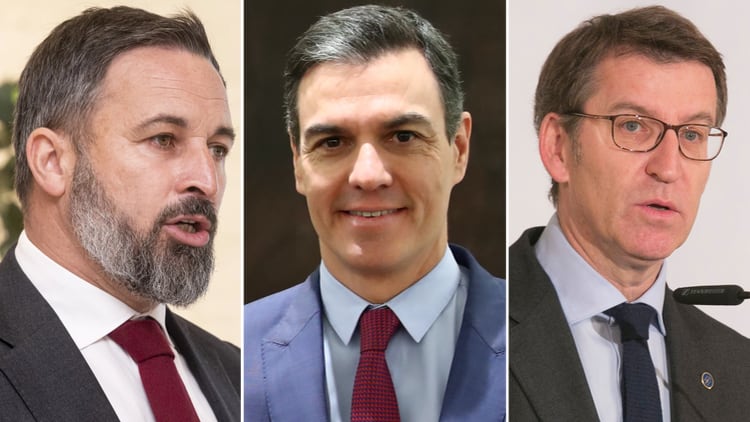Ángel Collado
Pedro Sánchez, in order to halt the rise of the Popular Party, is once again taking advantage of the extreme right’s desire for prominence. In the early stages of this year’s long electoral pre-campaign and in order to gain presence, Vox torpedoes and votes with the left against key projects of regional governments of the PP in which it is not involved, such as that of Madrid, or destabilises the only one it is part of, that of the Castilla-León regional government.
As extremes feed off each other, the party led by Santiago Abascal uses the radicalism of the Government to make the opposition more radical and populist, while Sánchez equates the PP with Vox in his basic argument to mobilise the left against the rise of the party presided over by Alberto Núñez Feijóo.
This script of alleged twinning of “the right and the extreme right” put forward by socialists and podemitas clashes with the reality experienced by the PP in governments or city councils where Vox is decisive and tends to become the biggest obstacle to its management.
Abascal’s party, after failing in the regional elections in Madrid and Andalusia, is trying to revive its project to replace the traditional centre-right in Spain, the PP. It is inspired by and follows the model that has triumphed in France with Marie Le Pen, or even governs in Hungary with Víktor Orban and in Italy with Giorgia Meloni.
Vox, the third party in Congress with 15 per cent of the votes in the 2019 general elections, was fundamental two years ago for Sánchez to be able to directly administer, from his cabinet and without any independent control, the European recovery funds. Without a majority to validate the corresponding decree in Congress, which would have forced him to make a pact with the PP, the head of the Executive found himself at the last minute with an abstention from the parliamentary group of the extreme right that paved the way for him to manage the 150,000 million euros coming from the EU.
Vox’s favour was decisive for the stability of the Socialist-Communist coalition government in power, and its president then highlighted the “sense of State” that Abascal had demonstrated against the then head of the opposition and president of the PP, Pablo Casado.
Since then, Isabel Díaz Ayuso, from the Community of Madrid; Juan Manuel Moreno, from the Andalusian regional government; and Núñez Feijóo, from the PP leadership, have put the brakes on the prominence and influence of the extreme right. The first two have already grouped together the bulk of the centre-right vote in their regions, while Feijóo is on the same path in all private polls.
To raise its profile and recover its presence, Vox has added its votes to those of the left-wing bloc (PSOE and Podemos populists) in the Community of Madrid and in the Madrid City Council to prevent both institutions from having budgets, the most important project in each year and four months before the elections.
It has been a blow against the PP promoted by Abascal’s party in order to assert themselves and make it difficult, in the near future, such as the elections on 28 May, for the foreseeable victories of Díaz Ayuso and Martínez Almeida to leave them even more out of the game than they are now.
In the PP, they want to take advantage of Vox’s turn in Madrid to appeal to the unity of the centre-right vote in the next elections and to scratch something in that 9 per cent of voters where Rocío Monasterio (Abascal’s candidate) was left two years ago.
In the case of the measures on abortion announced by the vice-president of the Junta de Castilla y León, Juan García Gallardo, there is also Vox’s pre-electoral eagerness for prominence. There was no new protocol of support for motherhood, no pact to protect it, nor any measure against the current legislation on termination of pregnancy.
Abascal’s supporters presented themselves as champions of the defence of life without having done anything in practice, and Sánchez took advantage of this to present the Junta de Castilla y León as the enemy of women. He even sent injunctions against the regional government, although there was no text, procedure, administrative act or practice to appeal.
Once the spectacle of feedback was over, both actors, Sánchez and Vox, left the stage: the national executive was satisfied with the three days of crisis in the Junta, while García Gallardo, despite being disavowed by the head of the regional executive, Alfonso Fernández Mañueco, remained in his post and without protocol. He neither resigned nor was he dismissed. The PP now trusts that the electorate will realise the consequences of having to carry Vox in more regional governments and will opt for majorities such as those of Ayuso or Moreno.







